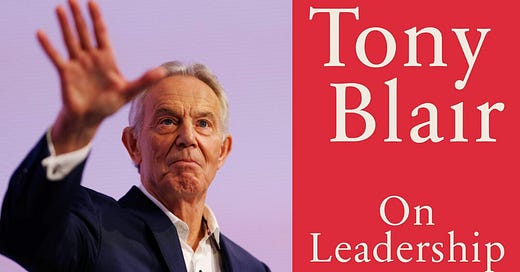Tony Blair's new book is a must read for politicians
A much needed instruction manual for today's leaders
Here’s a different kind of column—a book review. Given the Lord of the Flies atmosphere in Ottawa, our current and aspiring politicians really should read Tony Blair's latest book On Leadership.
Thank you to The Hill Times for publishing this review today. The text is below.
Have a merry Christmas and a happy New Year.
MJ
According to legend, when a Roman emperor rode triumphantly in his chariot through Rome, a slave stood behind him and whispered in his ear, “Look behind you. Remember you are only a man.” The intention was to remind the emperor to govern with humility and wisdom.
If today’s politicians are not students of classical history, they now have a more modern textbook on leadership that describes the same hazards the Romans sought to avoid.
Set aside your political views of former British Prime Minister Tony Blair. Indisputably, he remains the most successful Labour leader in UK history, having led the country for ten years with three straight majority wins. By dint of that, he has something to teach today’s crop of current and aspiring political leaders.
Blair’s On Leadership: Lessons for the 21st Century is not a tell-all rehash of old political battles. No scores are settled or secrets spilled. Instead, he offers his insights on leadership techniques and skills, including those obtained in his post-political career advising global leaders.
He doesn’t delve into the high policy of political leadership, but instead he advises on the operational and the emotional aspects. No detailed knowledge of British political history is needed.
Essentially, he has written a political leadership textbook, which is a refreshing change from the dense, self-congratulatory tomes most ex-leaders publish that are tough slogging and take months to finish. By doing so, he attempts to provide a resource that he never had upon assuming power.
For governments to succeed, the leader must strike the right balance of politics, policy, delivery, and communications, all the while staying focused on real results and improved standards of living for people. “Everything in this book is designed to explain why delivery, making the change which works, is the only real test of government.” Optimism is key: “No one wants to get on a plane with a depressed pilot.”
For today’s politicians who fixate more on social media influence and less on impactful, on-the-ground results, leading to disillusionment on both the right and left, Blair issues this warning: “If conventional democratic politics doesn’t seem to work, the person promising the biggest shake-up, creating the most stir, provoking the most outrage among the conventional, succeeds.” Examples abound.
And he goes yet harder on the failure of today’s leaders to head off hot button populism. “When countries appear helpless on immigration, or weak in the face of extreme positions on culture war issues, we give sustenance to the populist.”
On the personal side, Blair affirms the old advice of former US President Harry Truman that if you want a friend in politics, get a dog. “You are liked and resented in varying proportions” which ends up mirroring the leader’s feelings about the job itself. You love the work, but at same the time loathe its intrinsic stresses, frustrations, and disappointments.
Not surprisingly, to survive, a leader must create coping mechanisms. “Some of it comes from possessing the right temperament, a very important quality in leadership: the ability to rise above, to keep calm…” Blair describes the necessity of having a “hinterland” of family, non-political friends, hobbies, and interests that keep you sane, grounded, and ultimately make you a better leader.
You wonder if he now thinks that he was too young to gain such high office only a few days shy of turning 44. Had Blair known back then what he knows now, he admittedly would have done some things differently. But that applies to all our lives. Undoubtedly, he would have been a more effective prime minister if he had more time to mature and gain wisdom prior to office but he can’t be faulted for that. His opportunity knocked when it did.
On readability, it seems as if the text was dictated, not written, flowing as it does. You can’t help but hear his distinct voice and cadence as you read along. Its British syntax and idiom may seem a touch foreign to North American readers. Regardless, the book is an easy read with its conversational style and short, unintimidating chapters that are perfect for your daily commute or a quiet winding down before lights out.
The core takeaways? Stay focused. Do your homework. Be positive. Protect your time. Stay humble. Don’t expect accolades. Delivery is everything.
When Canada and arguably the Western world are at a low ebb in political ability and dominated by smashmouth politics, if only one leader’s performance is even slightly improved after reading On Leadership, Blair will have fulfilled its purpose.
I go back to what I wrote at the beginning. Regardless of your thoughts on his legacy, Tony Blair has many lessons to teach on political leadership. And he teaches them well.





Mark is a smart and insightful writer who takes the wider long view. Refreshing and stimulating.